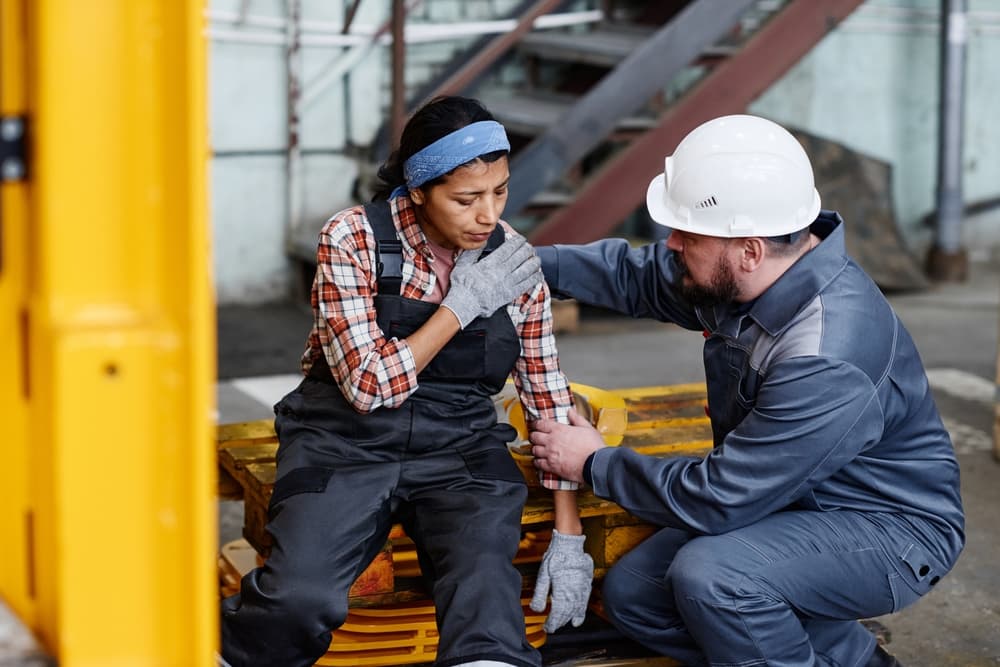We Answer Our Clients' Frequently Asked Questions About Personal Injury Law
When you leave home in the morning, you never predict that a personal injury will disrupt your life. Accidental injuries occur suddenly, and they usually take you by surprise. Shoppers fall while they’re browsing isles. Vehicles crash during commutes. Unrestrained dogs attack when you least expect it. Some people walk away unharmed from these incidents, while others sustain life-changing injuries.
When our personal injury attorneys at Nicolet Law Accident & Injury Lawyers represent you, we take immediate steps to protect your legal rights. We determine if a responsible party owes you compensation for your injuries and take action on your behalf. We review your case during a free consultation. In the meantime, please review our Personal Injury FAQ. It provides helpful information to consider when you or a loved one sustain injuries.
What Is a Personal Injury?

Personal injury is a commonly-used term that describes an accidental or intentional body injury. As the American Bar Association explains, lawyers use the term when describing a case involving harm caused by a negligent party’s actions.
What Types of Accidents Cause Personal Injuries?
At Nicolet Law Accident & Injury Lawyers, we handle claims for injuries due to many accidents. We have successfully resolved these and other cases for our injured clients.
Vehicle Crashes

Lawyers handle more auto accident cases than any other personal injury claims. Crashes involve accidental impacts with cars, pickup trucks, motorcycles, bicycles, pedestrians, tractor-trailer rigs, and commercial trucks in all classes.
The National Highway Transportation Administration finds that vehicle crashes often occur due to risky driving behaviors. Operators cause accidents while speeding, distracted, or drowsy or while driving under the influence of alcohol or drugs.
The most recent statewide crash data from the Wisconsin Department of Transportation and Minnesota Office of Traffic Safety reveal these statistic:
Wisconsin
- Total crashes: 115,694
- Fatal crashes: 540
- Total Injuries: 32,373
Minnesota
- Total crashes: 63,751
- Fatal crashes: 488
- Total Injuries: 24,083
Vehicle accident victims spend time and financial resources treating injuries ranging from sprains to fatal trauma. Crashes contributed to 49 percent of the brain injuries in the Traumatic Brain Injury Model Systems (TBIMS) 19,045-person database. Auto accidents also caused 37.7 percent of the spinal cord injuries in the 35,675-person National Spinal Cord Injury Statistical Center database.
A vehicle’s weight and speed affect what happens during and after a crash. When a large truck—10,000 pounds minimum weight or greater—crashes into a much smaller car, the impact often causes heavy vehicle damage and severe or catastrophic injuries. When a speeding car strikes a vehicle, the speed enhances the impact and increases the chances of significant damage and injuries.
All Terrain and Utility Task Vehicle Accidents
While ATV and UTV casualty numbers aren’t as staggering as vehicle accidents, people sometimes sustain serious injuries while using these off-the-road vehicles. Manufacturers design them for recreational, off-road use.
However, under certain circumstances, both Wisconsin and Minnesota allow limited ATV and UTV use on the road.
State data reflects these casualty statistics.
- Wisconsin’s most recent Recreational Vehicle Safety Education & Enforcement Report confirms 245 non-fatal injury crashes, 47 fatalities, and 311 injuries.
- Minnesota categorizes ATVs and UTVs as Low-Powered Unconventional Vehicles, but the Office of Traffic Safety includes ATV/UTV crash data in their vehicle accident statistics. Their most recent annual report confirmed 12 fatalities and 49 injuries.
Both states allow self-reported accidents. Riders must report ATV or UTV crashes only if they cause fatalities or injuries requiring medical treatment.
Premises Accidents

Accidents often occur when an owner negligently maintains, cleans, or repairs their property. In some cases, the owner doesn’t keep the property safe from criminal actions or fails to warn of a hazard others might not notice. Negligently maintained property or negligent actions can cause slip-and-falls, stairway accidents, falls from landings, and other elevated surfaces. They also contribute to dog attacks, pool accidents, drownings, near-drownings, and other incidents.
Premises accidents can cause minor to catastrophic injuries ranging from strains and fractures to internal damage and brain trauma. TBIMS data shows that falls caused 29 percent of the traumatic brain injuries in their database.

Wrongful Death Claims
When your loved one dies because of someone else’s actions, state laws and legal directives determine who receives compensation. The process is complicated and often overwhelming. We have worked with many bereaved families in resolving these complex cases and evaluating liability, injury, and damages issues.
Who Decides if I Receive Compensation for My Personal Injury Claim?

When you sustain injuries due to someone else’s negligence, an insurance company usually decides the initial outcome. Most individuals, businesses, and organizations maintain liability insurance to pay personal injury claims on their behalf. When you report an injury to a responsible party, they usually report it to their insurer.
Insurance companies then investigate your claim. If they determine that their insured is legally responsible for your injuries, they sometimes negotiate a settlement. If they believe that their insured didn’t cause your injuries, they deny your claim.
Even if another person was negligent and caused your injuries, that doesn’t mean the insurance company will offer you a fair settlement. Insurance representatives often turn claim negotiations into a battle. They may offer to settle for some or most of your immediate medical expenses and lost wages. However, if you or a legal representative doesn’t demand money for non-economic or subjective damages (pain and suffering), the insurer will often delay your claim and wait for your statute of limitations to expire.
Once that statute runs, you usually lose the right to file a lawsuit for compensation, and without the threat of a lawsuit, the insurer will refuse to settle.
Self-Insured Companies Handle Their Own Claims
Major corporations sometimes self-insure their liability exposures and handle their own claims. Some companies run their own captive claim department. Others hire an independent service to investigate and evaluate their self-insured liability exposures. If they determine that their company owes compensation for an injury claim, they negotiate a settlement and pay it out of their company’s assets.
How Does an Insurance Company Decide Liability for a Personal Injury?
Insurers conduct investigations using claim personnel or independent claim investigators. They take statements, perform site investigations, and talk to witnesses. When dealing with particularly complex issues, they sometimes hire accident reconstructionists or other experts.
Insurers evaluate most liability claims using a simple negligence standard.
- Duty Owed: Did their insured owe you a duty to drive safely, maintain their property, manufacture a safe product, etc.?
- Duty Breached: Did they fail to meet that duty?
- Proximate Cause: Did their failure cause the accident?
- Damages: Did the accident caused by their actions cause you harm and loss?
Dog Attack Claims Follow a Strict Liability
In most situations, laws in Wisconsin and Minnesota hold a dog owner strictly liable if their dog attacks you without provocation. The owner is legally liable for your injuries unless your actions provoked the attack. A non-owner is legally responsible if they are caring for the dog or it’s in their custody or control. In Wisconsin, a second reported incident subjects the dog owner to enhanced penalties and damages.
Do I Have to Talk to the Insurance Claims Investigator?

You don’t have to talk to a liability claim investigator. You shouldn’t interact with them until you consult with a personal injury attorney. When an attorney represents you, they usually recommend you not communicate with an insurer without their guidance. Unless you understand the legal issues, anything you say or do may jeopardize your claim.
When an insurer calls or sends someone out to talk to you, they represent their insured, not you. By the time they contact you, they will have already taken their insured’s statement and begun an investigation.
As a liability insurer represents their insured, their version usually influences the investigator’s approach when dealing with you.
- If their insured insists they weren’t at fault, the investigator often looks for ways to confirm that position.
- As they sit in your home or listen to your voice, an investigator evaluates you and judges whether you make a good witness on your own behalf.
- They ask the same question in different ways, documenting any inconsistent responses.
- When you provide a recorded statement, they sometimes prepare a transcript so they can review every word.
Does a Claims Representative Need My Permission to Record My Statement?
Minnesota and Wisconsin are both One-Party permission states for recording conversations within the state. Only one of the parties in the discussion (the investigator) must give their permission. A claim investigator usually asks permission to record your statement. If you refuse, they may still record your conversation and use it as a reference for disputing your position. Also, remember that some smartphones can create an instant transcript of any conversation.
Should I Give the Claim Investigator a Defective Product?
No. If a defective product injures you, only release it to your attorney. Obtaining the defective product is one of a claim investigator’s primary obligations. The manufacturer and the liability insurance company usually require testing to disprove your claim. Often that involves destructive testing, a process that virtually destroys the product, preventing additional meaningful testing. This lessens your chances of proving your claim.
Must I Accept the Insurance Company’s Decision?
You have some control over resolving your own claim. If the liability insurance company or self-insured entity doesn’t treat you fairly, you have other options. At Nicolet Law Accident & Injury Lawyers, we resume stalled negotiations or file a lawsuit on our client’s behalf. We also participate in Alternative Dispute Resolution processes such as Mediation.
Do I Have a Claim Deadline?

After an accident-related injury, you have a specific amount of time to resolve your claim called the statute of limitations. You should consult with our personal injury attorney immediately following your accident to determine how long you have to file. Your timely notification gives us an opportunity to conduct an investigation and review the liability issues. Our early involvement provides the insight you need to make an informed decision about resolving your claim.
However you choose to resolve your claim, you should take action long before the statute of limitations expires.
- Wisconsin allows you three years from the date of your accident to settle a claim or file a lawsuit. You have two years to file a wrongful death claim.
- Minnesota provides generally a six year statute of limitations for most injury claims, but it can be shorter in some injury cases. Additionally, you have four years to resolve a defective product claim where you allege strict liability and three years to file a wrongful death claim.
Do I Need an Attorney to Recover Personal Injury Compensation?
You should never deal directly with an insurer or self-insured company. You have a right to handle your own claim, but you will benefit from someone representing you who understands the legal and damages issues. At Nicolet Law Accident & Injury Lawyers, we take care of claim complexities while you focus on healing.
Insurers offer you a handshake and a smile. They’re often nice in the beginning, knowing most injured people don’t understand legal issues or damage values. They see your self-representation as an opportunity to settle your claim for a low dollar figure. Sometimes they deny your claim, forcing you to pursue legal action. Filing a lawsuit independently is an immense task with many pitfalls that an attorney can ensure you avoid.
Contact Our Personal Injury Attorneys

When someone injures you, contact us to learn more about making a personal injury claim. At Nicolet Law Accident & Injury Lawyers, we work hard for our injured clients. When appropriate, we investigate accidents, communicate with insurers, and work to recover compensation on our client’s behalf.
When you schedule a free consultation, we discuss your case and give you an opportunity to ask questions. For your free claim evaluation, call us at (612) 446-3999 or visit our contact page and leave a detailed message.